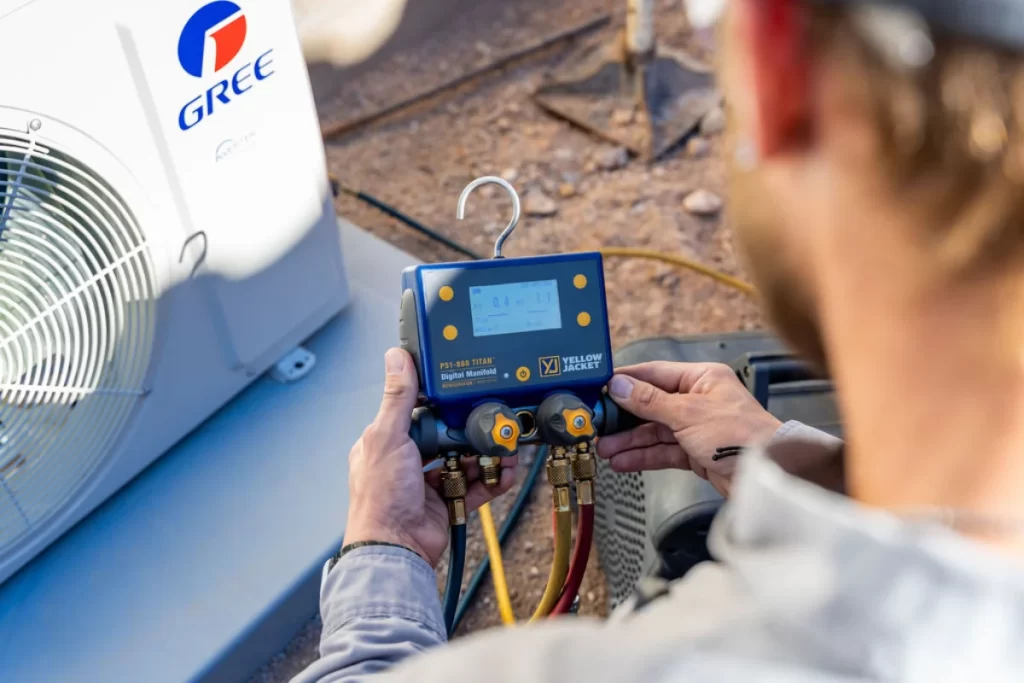
- Check the Thermostat Settings: Set to cool mode and set the temperature lower than the room temperature.
- Replace or Clean the Air Filter: A clogged air filter can restrict airflow, causing the unit to not cool effectively. Check and clean or replace the filter if necessary.
- Inspect the Power Supply and Breakers: During brownouts or power issues, your AC might not function properly. You should carefully check the power supply and ensure the breakers haven’t tripped.
- Allow Time for Compressor Reset: Give the compressor time to reset. If it gets too hot and enters thermal lockout, wait a few hours for the compressor to cool down and reset.
- Get in Touch with a Professional: If a simple reset and changing the air filter does not work, speak with a representative to figure out the problem.
With the summers in Tucson becoming increasingly hot, an efficiently functioning air conditioner is key to maintaining comfort in your home. If you are dealing with your a/c not cooling and simply blowing warm air, it can be puzzling, frustrating, and potentially dangerous depending on the heat of the day.
The above is a scenario many homeowners dread. Although the air conditioning unit is on, hot air is still blowing from your vents. This problem can turn what should be a sanctuary from the heat into an uncomfortably warm space.
So, is your air conditioning running but not cooling?
Especially during peak Tucson summer months, you need to troubleshoot this immediately. From wrong thermostat settings to clogged air filters, the reasons why your AC is not running and how significant they are can vary. However, the need for a quick and effective solution remains the same.
As a commercial and residential HVAC Contractor in the Greater Tucson Area, we’ve done thousands of AC unit repairs when they are blowing warm air and created this guide to help you troubleshoot basic air conditioner issues.
In our guide, we dive into practical steps and troubleshooting tips with the air conditioner running. These tips will help you address the common question: “Why is my AC not cooling?” based on our decades of experience maintaining and installing air conditioners in Tucson and the surrounding areas. Additionally, you can gain more insights by understanding single stage vs two stage AC systems.
You can also check out our Podcast Episode of Ask the Trade Pros, where professional HVAC technicians Jordan and Todd share basic troubleshooting steps when your AC is running but not cooling.
You can listen to the Podcast episode below:
Our company’s aim is to equip you with the knowledge to tackle these issues head-on. This will ensure your conditioner not cooling the house phase ends soon. Following these tips will make you comfortable regardless of the outside temperature.
If your AC issues go beyond the scope of these basic troubleshooting tips, it’s probably time to call in an HVAC expert. If you are located in Tucson or the surrounding area, contact our Done Rite Services HVAC team and we will get it handled quickly and efficiently, ensuring your system receives the professional care it needs when necessary.
Table of Contents
Immediate Actions Your AC is Running But Not Cooling
Before you consider a professional assessment, there are a few easy checks you can perform if you find your AC running but not cooling the house. These checks could potentially resolve the issue of an air conditioner not cooling.
Examine the Thermostat: It’s easy to overlook the basics. Ensure that you set your thermostat to ‘cool’ mode and the temperature is lower than the current room temperature. Using incorrect settings, such as ‘heat’ or ‘off’, are surprisingly common and you can quickly rectify them.
Check Your Air Filter: A frequent but often neglected cause of an A/C running but not cooling is a clogged air filter. Airflow is crucial for your AC’s operation, and a blocked filter can significantly reduce its efficiency. Inspecting and, if necessary, replacing or cleaning the air filter can make a huge difference. This is not only for immediate cooling process needs but also for the overall health of your system.
Power Supply Check: In areas prone to high electricity demand, such as in Southern Arizona during the summer, brownouts are a possibility. These reduced power situations can impact the functionality of your air conditioning unit. Additionally, you can get a quick inspection of your home’s circuit breakers. These inspections will reveal if a tripped breaker is why your air conditioning is not cooling the house. For residents in specific areas, we offer HVAC services in Oro Valley.
Give the Compressor Time: After a power fluctuation or during extreme heat, the compressor may need time to reset. This thermal lockout is a safety feature designed to protect the unit from overheating. If you suspect this is the case, allowing the unit to rest and cool down for a while might be the solution you need.
Addressing a Frozen Evaporator Coil: If you see ice inside the coil, turn off the system. Then, allow the coil to thaw before using it again. Low refrigerant levels or limited airflow are often why this may occur. Addressing this issue quickly is critical to overcome the air conditioning not cooling the house.
These first steps can not only solve the issue of an air conditioning unit not cooling but may also be useful for future challenges. Regular attention to these details ensures your AC runs efficiently, keeping your home comfortable during warmer days.
Thermostat Troubles: A Common Culprit for AC Issues
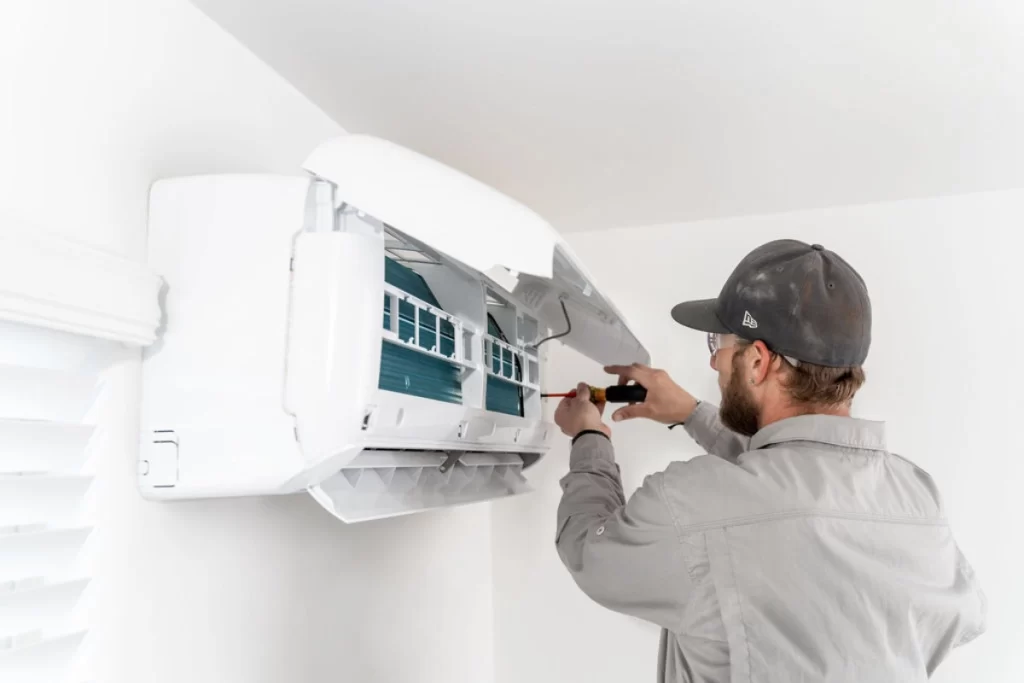
A frequent, overlooked problem when your air conditioner is not cooling is the thermostat. This small device that regulates cooling cycles plays a major role in your AC absorbing heat. A few common issues can prevent it from functioning effectively.
Setting and Scheduling Errors: First, ensure that you set your thermostat correctly. This means checking that it’s in ‘cooling’ mode and that the set temperature is lower than your home’s current temperature. Moreover, programmable thermostats might revert to scheduled settings, which may not align with your immediate cooling needs. You can also review and change these schedules to ensure they reflect your current preferences, especially as seasons change.
Battery and Power Issues: If your thermostat display is blank or not functioning correctly, the batteries might need replacement. Similarly, power issues or loose wiring within the thermostat can disrupt its operation. You should adequately power it and secure all its connections.
Sensor Problems: Thermostats rely on sensors to read the room’s temperature accurately. If the sensor is not functioning or not positioned correctly, it might not gauge the temperature accurately. This may lead to the AC underperforming or overworking. Ensuring you play sensor away from heat sources can help maintain accurate temperature readings.
Calibration Issues: Over time, a thermostat may need recalibration, especially if it’s an older model. Incorrect calibration can result in the thermostat not triggering the AC at the right time or temperature. As a result, the air conditioner is not cooling effectively. Addressing these issues can be an easy and cost-effective step in troubleshooting your AC’s performance problems. Ensuring that you set, power and operate it can often resolve why your AC is not cooling. This is so you can save time and potential expenses on harder repairs. For comprehensive guides, you can refer to home inspection process details.
The Impact of Air Filters on Your AC’s Cooling Efficiency
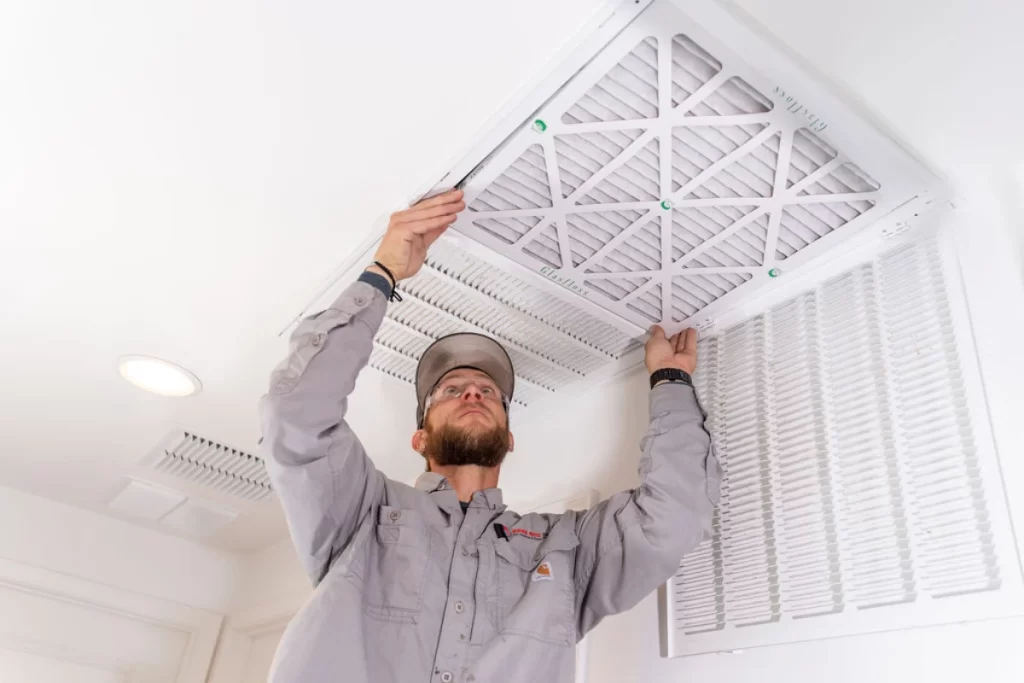
One common yet often underestimated factor affecting your air conditioner is its air filters state. A clean, clear air filter is important for keeping strong airflow. This is essential for your AC to cool effectively.
The Role of Air Filters: Air filters trap dust, dirt, and various airborne particles, ensuring the air in your home remains clean. However, over time, these filters can become clogged with debris, which can significantly impede the airflow. Reduced airflow means your AC has to work harder to circulate air. This leads to air conditioning units not cooling effectively or even causing it to freeze up.
Regular Checks and Replacement: To prevent these issues, it’s important to regularly check and replace your air filters. How often you should replace can vary depending on the type of filter, AC unit usage, and whether you have pets. As a rule of thumb, we recommend you check your air filters monthly and replace them every 90 days. However, in homes with pets or in high pollen areas, more frequent changes might be necessary.
Signs of a Clogged Filter: Visible dust and debris are the most obvious signs of a clogged filter. You should also change your filter if air quality decreases, vent airflow is lower, or if there is a higher energy bill. A clogged filter forces your AC to expend more energy to cool your home, thus increasing your utility costs.
DIY Filter Maintenance: Replacing or cleaning your air filter is typically a simple task that homeowners can do themselves. It involves removing the old filter, cleaning the area if necessary, and inserting a new filter. Ensure the filter is the correct size and type for your unit. An ill-fitting filter can be just as ineffective as a dirty one.
By maintaining clean air filters, you can significantly improve your air conditioning’s efficiency and longevity. This simple step can often resolve issues related to your air conditioning not cooling enough.
Power Supply Problems: Understanding Brownouts and AC Functionality
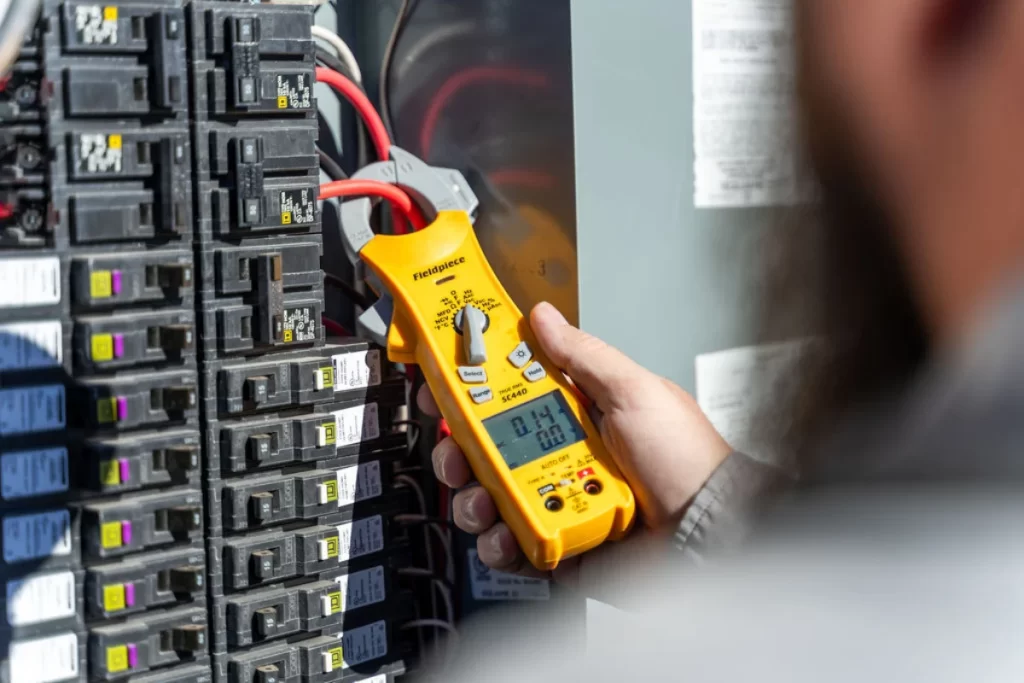
An often-overlooked aspect that can greatly affect your air conditioning system is the power supply, particularly with brownouts. Understanding how these power fluctuations affect your AC’s function is crucial. They can help you understand why your air conditioning might be running but not cooling.
What Are Brownouts? Brownouts occur when there’s a drop in the voltage in an electrical power supply system. Unlike blackouts, where there is a complete power failure, brownouts result in reduced power availability. Utility companies often deliberately induce them to prevent a complete power outage.
Brownouts can be common in areas with high demand for electricity, potentially including Tucson and the surrounding area during peak summer. They are especially common during heatwaves when many households and businesses are using their AC.
Impact on Air Conditioning Units: During a brownout, your AC may not receive enough power to operate fully. This can lead to situations where the air conditioning unit is not cooling the house as efficiently as it should. In some cases, brownouts can cause the AC system to short cycle or even temporarily shut down. This is especially true if the system has built-in safety protocols to prevent damage during low voltage conditions.
Checking Your Circuit Breakers: A tripped circuit breaker can also limit your AC unit’s cooling ability. A good practice is to check your home’s electrical panel. You can ensure that the AC unit breakers are in the correct position this way.
A breaker that has tripped will often be in a midway position between ‘On’ and ‘Off.’ Resetting the breaker can sometimes resolve the issue. If it trips repeatedly, however, it can mean a serious electrical problem that requires professional attention.
Precautions and Professional Assistance: Contact a professional if your AC’s cooling issues are because of power supply. An HVAC technician can assess whether brownouts or other electrical issues have affected your unit and recommend appropriate solutions. Additionally, during known brownout periods, it is advisable to reduce electrical strain. You can do this by limiting the use of other high-power appliances.
By being aware of brownouts and circuit breaker status, you can address running but not cooling air conditioner situations. For any installations, you can rely on reliable air purifier installation.
When to Seek Professional Help for Your AC
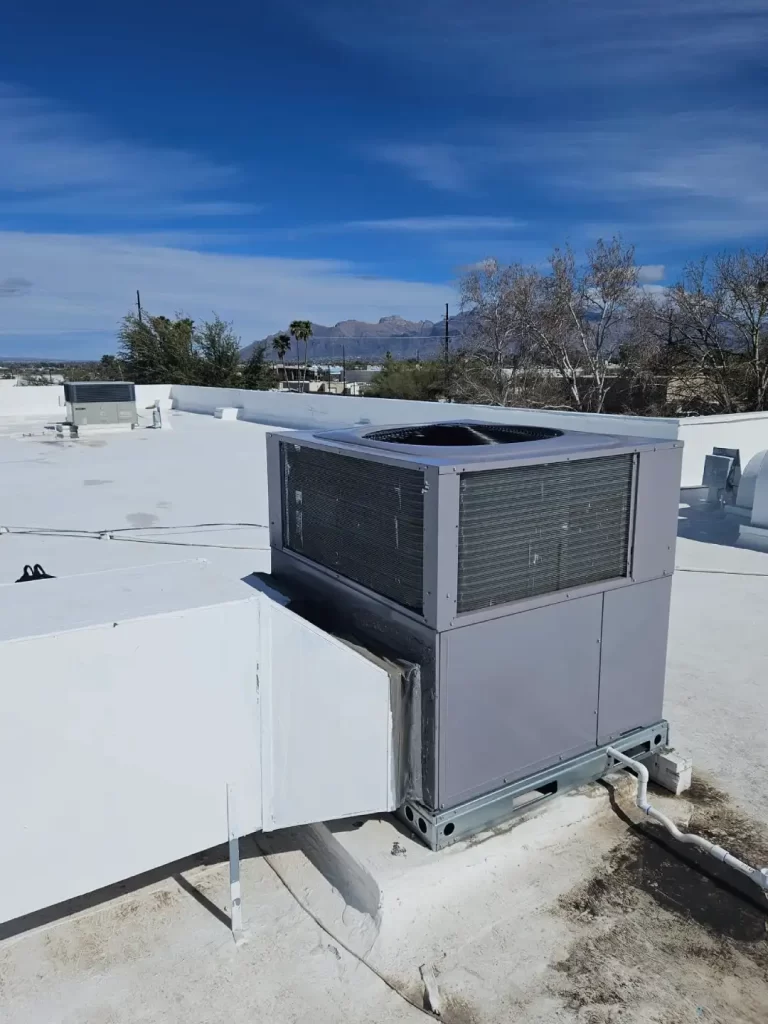
You can resolve many air conditioning issues with DIY troubleshooting. However, there are instances where you may require reliable air conditioner repair. Knowing when it is time to call in an HVAC expert is crucial. When unable to fix the problem, or if issues are harder to understand than basic troubleshooting, that is when it is time.
Persistent Cooling Problems: Say there are still cooling issues despite looking into everything. You should reach out to a professional in this case. Persistent issues could indicate more complex problems. These include refrigerant leaks, compressor malfunctions, or electrical component failures. Issues with refrigerant lines should always be left to a professional.
Unusual Noises or Odors: Pay attention to noises or odors. These sounds may involve grinding, squealing, or banging, or strange odors. They are clear indicators that something is wrong with your AC unit. Such signs often point to mechanical issues or burnt-out components, which require professional assessment and repair.
Frequent Cycling or Overheating: If your air conditioning is cycling or overheating often, these can mean deeper problems. Frequent cycling can strain the AC system. This may lead to wear and tear, and potentially more significant damage if you do not address it properly.
Safety Concerns: Dealing with electrical components or refrigerants can be hazardous. If any repair involves handling these elements, it’s safer to leave it to professionals. This is especially important in older AC systems that might have outdated or potentially dangerous components.
Efficiency and Longevity: A professional HVAC technician can resolve why your air conditioning is not cooling. In addition, they can provide maintenance that ensures long-term unit efficiency and longevity. Regular professional maintenance can prevent future problems, saving you time and money in the long run.
In summary, while many air conditioning problems are solvable, recognizing when to seek professionals is key. Experts in HVAC systems can offer the necessary skills and tools to diagnose and fix more complex issues. This will mean that your air conditioning continues to provide reliable cooling when you need it most.
Conclusion: Ensuring Long-Term AC Efficiency
In our years of experience servicing and installing HVAC systems in Tucson, Marana, Vail, and the surrounding areas, we know the home comfort during warmer months depends on a working AC. Ensuring that your AC is not just running but effectively cooling is crucial.
Immediate troubleshooting can resolve many issues. However, long-term efficiency of your AC relies on regular maintenance and knowing when to seek professional help.
Regular Maintenance is Key: Regularly checking and maintaining your air conditioning system can prevent many common problems. This includes routinely replacing or cleaning air filters, checking thermostat settings, and ensuring a debris-free outdoor unit.
Preventative maintenance not only keeps your air conditioning unit from failing but also enhances its overall efficiency and lifespan.
Be Proactive with Seasonal Checks: As seasons change, it’s a good practice to give your AC system a thorough check. This not only prepares you for seasonal demands but also catches issues that could lead to larger problems.
Understanding Your Unit: Every air conditioning system has its specific needs and maintenance requirements. Familiarize yourself with your particular model’s guidelines and follow the manufacturer’s recommendations for servicing and maintenance. This knowledge can be invaluable in ensuring your unit runs efficiently.
Energy Efficiency: A well-maintained AC unit not only cools more effectively but also operates more efficiently. This can make saving money on energy bills easier. To augment AC efficiency, you should ensure proper insulation, use programmable thermostats, and seal doors and windows.
Consulting Professionals for Upkeep: Regular homeowner maintenance is important. However, you should schedule annual or bi-annual professional check-ups. These will keep your system running smoothly and identify potential issues before they become major problems. If you’re looking for the best HVAC services near you, we are here to help.
In conclusion, there are ways to troubleshoot the system if you find your AC not cooling. Consistent maintenance and a proactive approach to system care are a couple. Your air conditioner can remain an effective and efficient source of home comfort if you stay on top of things.
For issues with AC or other emergency HVAC services in the area, we advise you to take action. Contact Done Rite Services or give us a call at 520-369-3966. Our team is ready to provide the expert care and maintenance your system needs. Whether you need a new system, we offer affordable air conditioning installation.
Frequently Asked Questions about AC Not Cooling
Why is my AC running but not cooling?
Your AC might be running but not cooling due to a variety of reasons, such as a dirty air filter, low refrigerant levels, or a frozen evaporator coil. It’s essential to diagnose the exact issue for effective repairs.
Why is my AC coming out but not cold?
If your air conditioner is running but not cooling, it could be because of a malfunctioning thermostat, blocked vents, or insufficient airflow. Regular maintenance checks can help prevent these issues.
How do I reset my air conditioner?
To reset your air conditioner, first turn off the unit at the thermostat. Next, locate the reset button on the outdoor unit and press it. If there’s no button, switch off the power at the breaker for 30 seconds, then turn it back on.
